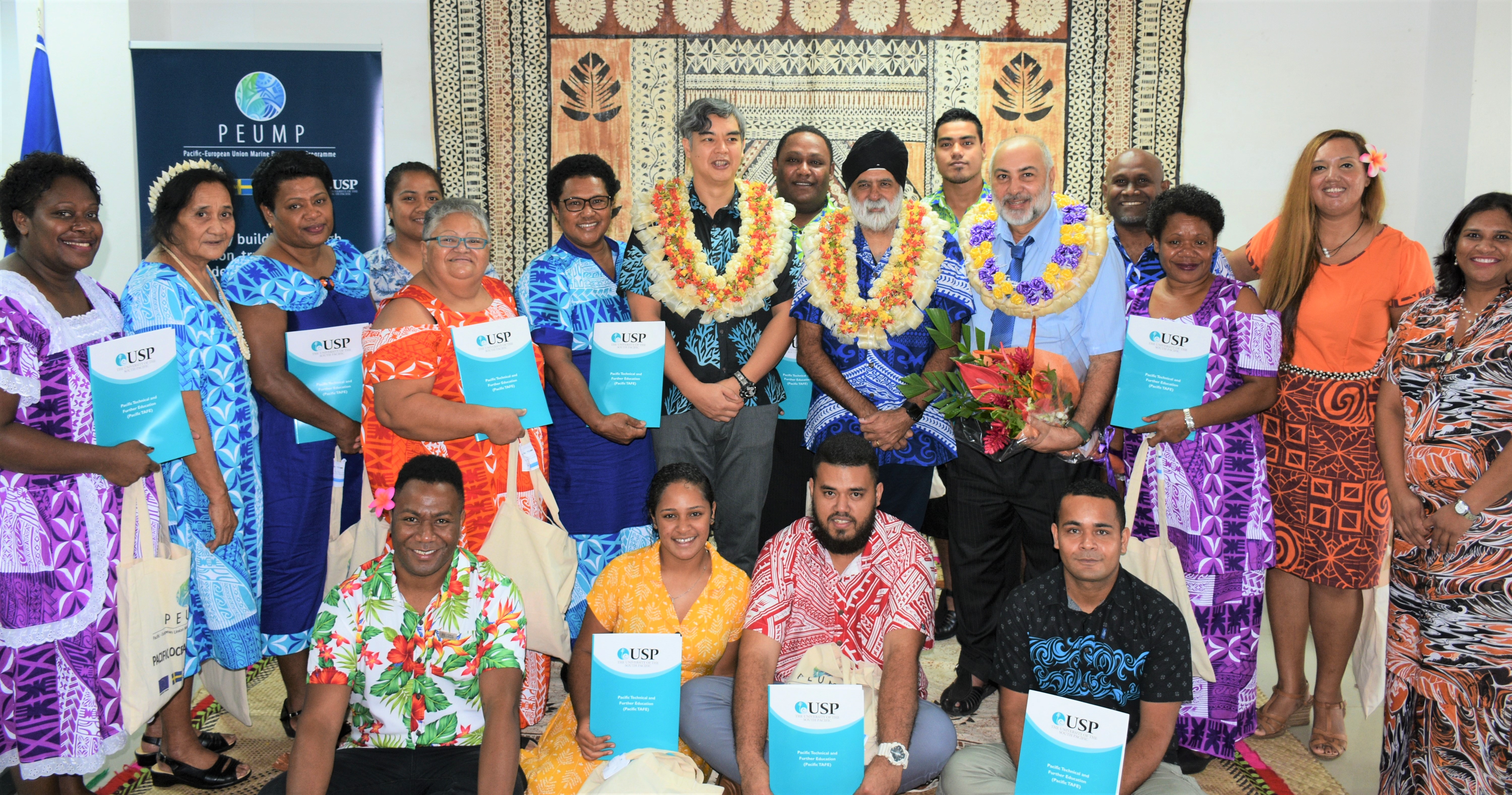Related News

Fifteen regional scholarship recipients of the University of the South Pacific (USP) Pacific -European Union Marine Partnership (PEUMP) Programme today became the first batch to graduate with a micro-qualification in Establishing and Operating a Small Seafood Business in the Pacific.
Small-scale seafood business is fundamental to the livelihoods and helps alleviate Pacific Islanders from poverty. To support the Pacific communities in this regard, the USP PEUMP programme introduced for the first time in the region, a micro qualification – Establishing and Operating a Small Seafood Business through the USP Pacific TAFE.
One of the recipients of the scholarship was the Director of the Catholic Women’s League (Teitoiningaina) for the Diocese of Tarawa and Nauru, Ioanna Nabura, despite the border restrictions in place said it was the gap of knowledge the Teitoiningaina needed.
“Seafood is our livelihood, our food and economy and it dawned on me as to my purpose of being in Fiji. I will take all these learning’s and somehow replicate this into our existing trainings which includes nutrition and food security for close to 33,000 members of the Teitoiningaina who are females – eighteen years and over.”
The first cohort included regional participation from Kiribati, Solomon Islands Vanuatu and Fiji. The scholarship recipients comprise of ocean artisans, seafood entrepreneurs, seaweed and aquaculture farmers, nine of which are women.
The Ambassador of the European Union (EU) for the Pacific, His Excellency Sujiro Seam said “With the Covid-19 crisis, at a time when families struggle to put food on the table, oceans are more than ever a blessing for the Pacific. As part of its engagement on oceans in the region, the EU focuses on sustainable management of marine resources and capacity building for coastal communities, with a focus on artisans and small entrepreneurs. The EU is happy to partner with USP and other regional organisations to implement in the Pacific the “farm to fork” strategy it promotes in Europe as a part of the European Green Deal”.
In congratulating the graduants, Vice-Chancellor, Professor Pal Ahluwalia, told them they had fulfilled the core vision of the University of the South Pacific by becoming inspirational agents of positive change leading to innovative, cohesive, resilient and sustainable communities.
“USP’s mission and the USP PEUMP Programme’s core objectives are aligned and we have managed to influence Pacific Islanders through the pursuit of excellence in knowledge by providing world-class education and research that improves lives as individuals and through our communities.” he said.
The USP is one of four key implementing partners of the PEUMP Programme, a EUR 45M initiative funded by the EU and the Government of Sweden. The USP, as main implementing partners, is focusing on building the capacity for Pacific islanders through education, training, research and development in fisheries and marine resources management.
For more information:
Josephine Prasad, USP PEUMP Project, Communications Specialist, +679 9922098, josephine.prasad@usp.ac.fj
Mohammed Nazeem KASIM, EU Press Officer, +679 3313-633, Mohammed-Nazeem.KASIM@eeas.europa.eu
The Pacific-European Union Marine Partnership (PEUMP) Programme addresses some of the most serious challenges faced by Pacific countries. Among these are the increasing depletion of coastal fisheries resources; the threats to marine biodiversity, including negative impacts of climate change and disasters; the uneven contribution of oceanic fisheries to national economic development; the need for improved education and training; and the need to mainstream a rights-based approach and to promote greater recognition of gender issues to ensure inclusiveness and positive changes for Pacific island people. The five-year PEUMP programme is funded by the European Union (EUR 35 million) and the government of Sweden (EUR 10 million). It is implemented by the Pacific Community (SPC), the Forum Fisheries Agency (FFA), the Secretariat of the Pacific Regional Environment Programme (SPREP) and the University of the South Pacific (USP) in close collaboration with Non-Government Organisations and the national authorities.
About Us
The University of the South Pacific (USP) is the premier institution of higher learning for the Pacific, uniquely placed in a region of extraordinary physical, social and economic diversity to serve the region’s needs for high quality tertiary education, research and policy development. One of only two regional universities of its type in the world, USP has 12 member countries: Cook Islands, Fiji, Kiribati, Marshall Islands, Nauru, Niue, Samoa, Solomon Islands, Tokelau, Tonga, Tuvalu and Vanuatu. USP is committed to achieving excellence and innovation for the sustainable development of Pacific Island Countries.
The Pacific-European Union Marine Partnership (PEUMP) Programme addresses some of the most serious challenges faced by Pacific countries. Among these are the increasing depletion of coastal fisheries resources; the threats to marine biodiversity, including negative impacts of climate change and disasters; the uneven contribution of oceanic fisheries to national economic development; the need for improved education and training; and the need to mainstream a rights-based approach and to promote greater recognition of gender issues to ensure inclusiveness and positive changes for Pacific island people. The five-year PEUMP programme is funded by the European Union (EUR 35 million) and the government of Sweden (EUR 10 million). It is implemented by the Pacific Community (SPC), the Forum Fisheries Agency (FFA), the Secretariat of the Pacific Regional Environment Programme (SPREP) and the University of the South Pacific (USP) in close collaboration with Non-Government Organisations and the national authorities.